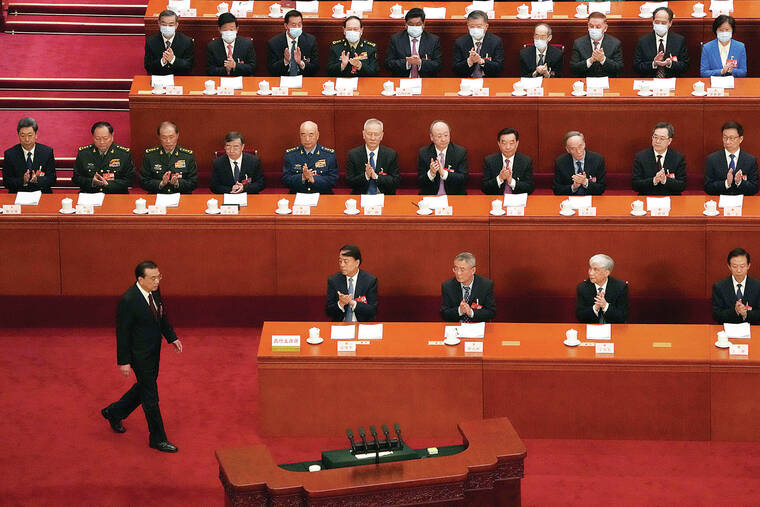BEIJING — China’s government announced plans for a consumer-led revival of the struggling economy as its legislature opened a session Sunday that will tighten President Xi Jinping’s control over business and society.
Premier Li Keqiang, the top economic official, set this year’s growth target at “around 5%” following the end of anti-virus controls that kept millions of people at home and triggered protests. Last year’s growth in the world’s second-largest economy fell to 3%, the second-weakest level since at least the 1970s.
“We should give priority to the recovery and expansion of consumption,” Li said in a speech on government plans before the ceremonial National People’s Congress in the Great Hall of the People in central Beijing.
The full meeting of the 2,977 members of the NPC is the year’s highest-profile event but its work is limited to endorsing decisions made by the ruling Communist Party and showcasing official initiatives.
This month, the NPC is due to endorse the appointment of a government of Xi loyalists including a new premier after the 69-year-old president expanded his status as China’s most powerful figure in decades by awarding himself a third five-year term as party general secretary in October, possibly preparing to become leader for life. Li, an advocate of free enterprise, was forced out as the No. 2 party leader in October.
Xi’s new leadership team will face challenges ranging from weak global demand for exports and lingering U.S. tariff hikes in a feud over technology and security to curbs on access to Western processor chips due to security fears.
Separately, the Ministry of Finance announced a 7.2% budget increase for the ruling party’s military wing, the People’s Liberation Army, to 1.55 trillion yuan ($224 billion), the 29th straight annual increase. China’s military spending is the world’s second highest after the United States. The Stockholm International Peace Research Institute says the two countries together account for half of global military outlays.
Li’s report called for boosting consumer spending by increasing household incomes but gave no details in his unusually brief, 53-minute speech. It was less than half the length of work reports in some previous years.
The premier called for “building up our country’s strength and self-reliance in science and technology,” an area in which Beijing’s state-led efforts to create competitors in electric cars, clean energy, telecoms and other fields have strained relations with Washington and other trading partners. They complain China steals or pressures foreign companies to hand over technology and improperly subsidizes and shields its fledgling competitors in violation of its market-opening commitments. Xi earlier singled out encouraging jittery consumers and entrepreneurs to spend and invest as a priority at the ruling party’s economic planning meeting in December.
Beijing needs to “fully release consumption potential,” Xi said, according to a text released last month.
Since taking power in 2012, Xi has promoted an even more dominant role for the ruling party. He has called for the party to return to its “original mission” as China’s economic, social and cultural leader and carry out the “rejuvenation of the great Chinese nation.”
Xi has crushed dissent, stepped up censorship and control over information, and tightened control over Hong Kong. Xi’s government has tightened control over e-commerce and other tech companies with anti-monopoly and data security crackdowns that wiped billions of dollars off their stock market value.
Beijing is pressing them to pay for social welfare and official initiatives to develop processor chips and other technology. That has prompted warnings economic growth will suffer.
Li’s report Sunday reinforced the importance of state industry. It promised to support entrepreneurs who generate jobs and wealth but also said the government will “enhance the core competitiveness” of state-owned companies that dominate industries from banking and energy to telecoms and steel.
Li also called for “resolute steps” to oppose formal independence for Taiwan, the self-ruled island democracy claimed by Beijing as part of its territory. He called for “peaceful reunification” between China and Taiwan, which split in 1949 after a civil war, but announced no initiatives.
Taiwan never has been part of the People’s Republic of China, but Beijing says it is obligated to unite with the mainland, by force if necessary. Xi’s government has stepped up efforts to intimidate the island by flying fighter jets and bombers nearby and firing missiles into the ocean.



